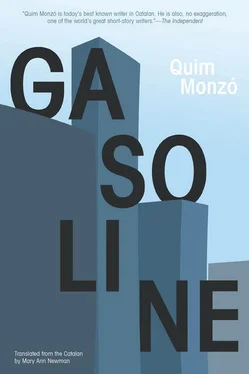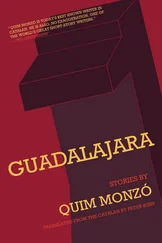Quim Monzó - Gasoline
Здесь есть возможность читать онлайн «Quim Monzó - Gasoline» весь текст электронной книги совершенно бесплатно (целиком полную версию без сокращений). В некоторых случаях можно слушать аудио, скачать через торрент в формате fb2 и присутствует краткое содержание. Год выпуска: 2010, Издательство: Open Letter, Жанр: Старинная литература, на английском языке. Описание произведения, (предисловие) а так же отзывы посетителей доступны на портале библиотеки ЛибКат.
- Название:Gasoline
- Автор:
- Издательство:Open Letter
- Жанр:
- Год:2010
- ISBN:нет данных
- Рейтинг книги:5 / 5. Голосов: 1
-
Избранное:Добавить в избранное
- Отзывы:
-
Ваша оценка:
- 100
- 1
- 2
- 3
- 4
- 5
Gasoline: краткое содержание, описание и аннотация
Предлагаем к чтению аннотацию, описание, краткое содержание или предисловие (зависит от того, что написал сам автор книги «Gasoline»). Если вы не нашли необходимую информацию о книге — напишите в комментариях, мы постараемся отыскать её.
Gasoline — читать онлайн бесплатно полную книгу (весь текст) целиком
Ниже представлен текст книги, разбитый по страницам. Система сохранения места последней прочитанной страницы, позволяет с удобством читать онлайн бесплатно книгу «Gasoline», без необходимости каждый раз заново искать на чём Вы остановились. Поставьте закладку, и сможете в любой момент перейти на страницу, на которой закончили чтение.
Интервал:
Закладка:
The woman from the museum takes them to the door and walks them out to the street. She reminds them that the opening is at 5:00 p.m. They get into the car. A driverless taxi is double-parked there, mostly taking up the parking space in front, but also partly blocking Humbert. Humbert maneuvers, but he is just barely unable to get out. People who double-park, with absolutely no consideration for others, drive him nuts. He steps gently on the gas until he touches the taxi’s chassis, and then he floors the accelerator, pushes the taxi forward, and steers it until it bumps into the car in front. Without missing a beat, he maneuvers again and gets out with no difficulty.
They have lunch in a Polish restaurant. They stroke each other’s hands across the table. At the table beside them two boys with Asian features discuss baseball. He turns back and contemplates Hildegarda. He centers his attention on her lips, the mere sight of which is enough to bring on an erection.
“Do you like baseball?”
Hildegarda opens her eyes wide (but Humbert hardly notices) and her lips (to say something), but then she stops and smiles. Humbert thinks perhaps he has asked the wrong question, but he’s not sure why. Changing tack, he says:
“Do you like sports?”
“. .”
“Do you like to swim? I do, I love to swim. Do you like to go jogging? Mountain climbing? When I was young, hiking was one of the sports I liked best. Running, too. . How about hockey? Many of my relatives have been field hockey players. My grandfather founded a club. Just to be contrary, I played ice hockey in high school. .”
Hildegarda is watching him.
“What about laughing? I really like to laugh. Do you? I like laughing better than talking. Do you like to talk? Do you like cars? What about cigarettes, what brand do you like best? I prefer unfiltered cigarettes to filtered. What do you like better, vodka or tequila? Between beer and wine, which do you like better? Do you like Italian or German food better? I like both. And what kind of movies do you like better: French or Scandinavian? Do you like French movies better, or American detective novels? When you were little, were you happier during Christmas vacation or summer vacation?”
Humbert looks at Hildegarda with a mixture of tenderness and embarrassment, and squeezes the hand under his affectionately.
“What a lot of nonsense, huh? What time is it?”
Before Hildegarda can look at her watch, though, he has already looked at his own.
“Do you like this watch? It’s a Cartier. Do you like men’s or women’s watches better? Do you like to wear jewelry? What do you think is more flattering on a woman: earrings, necklaces, or bracelets? Do you like earrings on men? And do you prefer they wear one earring or two?”
He stops talking. Just to have something to say, Hildegarda says:
“God, so many questions. .”
“Ask some, ask some yourself, quickly, the first thing that comes to mind: do you wear your shoes backwards? Have you ever eaten Tibetan food? What’s the capital of Liberia? What year was Queen Christina of Sweden born? What’s the formula of silver nitrate? What year did Garibaldi die? How many questions in a row are too many questions in a row ? Why are you holding my hand? Why have you suddenly let it go? Why have you taken it again? Why are you squeezing it tighter now? Do you love me? Do you think I love you? Will we grow old together, you and I? Why does this table have a pink tablecloth, and not white or blue? Why aren’t you asking any questions?”
“Because you ask enough for both of us. Shall we get started for the gallery?”
“Not yet. It’s early. Would you like to have dinner in an exotic place?”
“. .”
“It’s a real question. Where do you want to go for dinner?”
“We just had lunch. We haven’t even gotten up from the table. Don’t even talk to me about dinner.”
“No, no, no: where would you like to go for dinner? Surrounded by palm trees, in a solemn building, next to a lake. .?”
“We can think about it later, with a restaurant guide in front of us.”
“I don’t mean what restaurant would you like to have dinner at, I mean what city, what country would you like to have dinner in?”
Hildegarda delicately scratches the nape of her neck.
•
At the airport they find the fewest customers at the Aeromexico desk. They ask what’s available. A thin, dark man with blond hair explains the various options. They choose the one that — aside from being the earliest flight and one that doesn’t require a visa — seems most logical, since they are at the Aeromexico desk: Mexico City. Hildegarda spends the quarter of an hour licking a chocolate ice cream cone, and Humbert has an orange juice.
A few hours later they are on the Avenida de los Insurgentes, dining in a restaurant, stroking each other’s hands under the table, eating out of each other’s plates, laughing as they hail a taxi and ask the driver to take them to the airport.
They doze off in a Líneas Aéreas Paraguayas 747. When they reach Asunción, Humbert yawns his way through customs. Hildegarda laughs throughout the bus ride into the city. Humbert is not so sleepy as not to suspect, though, that it may be a little strange (but what exactly does “strange” mean?) to be having a meal of chicken and whiskey, a bottle of beer, and coffee for breakfast, at that time of the day, at a restaurant with blue- and pink-checked tablecloths, only to go dashing back to the airport where they catch an almost-empty plane. Humbert sleeps the whole way, clinging to Hildegarda’s arm. She is also sleeping when they reach Tenerife, wondering whether it is fun or not to be having lunch at that time of day, above all not even noticing what they’re eating, without time even to take a walk to digest the meal, before finding themselves on another plane that is taking them to Munich where — without even eating — they take another plane to Karachi, where it is already late at night, to have dinner at dawn, and then catch another plane, and have breakfast in Hong Kong in mid-afternoon. At the airport, since the plane they are waiting to board is delayed, they play hopscotch until they hear the announcement of their flight to Wellington, where they have lunch at midnight sharp, hurrying through dessert because — Humbert having no desire to see the country he has taken such pains to exhibit in — the plane that is to take them to Samoa is leaving right away, and they have to take it to get to Pago Pago to have dinner at high noon, speculating in the car that takes them back to the airport as to whether it is acceptable to qualify uncommon behavior as illogical. Once aboard the plane, Humbert reasons that, in point of fact, it was completely acceptable (and therefore possible; that is: normal!) to have lunch in the dark of night and breakfast as the sun goes down, which last they do, in fact, at the Honolulu airport, as they feel too tired to go into the city. They catch the first flight out and land in San Francisco, where they eat three meals in a row, in three contiguous restaurants on Market Street. In the evening they set down in New York on a TWA airplane.
They catch a cab. Humbert thinks he’ll have to have his car shipped from the Chicago airport. Hiledgarda sees a great deal of frolicking in the street. She asks the driver what day it is. The driver looks at them in the rearview mirror as if they were drunks who were trying to be funny. But, finally, he says New Year’s Eve. Hildegarda suggests they go to Tiziana’s house, where there was going to be a party.
When they arrive, midnight has long since passed. For them, though, Tiziana sets the clock back and everyone toasts again, and at each stroke of the clock, they all eat a grape. Humbert puts all the grapes in his mouth at once and chews them, forming a mass of skins that he delicately spits into a planter. A really young guy (who can’t quite carry off the perverse role he is affecting) tells him that he likes the exotic custom of eating grapes on the last twelve strokes of the old year. Humbert’s champagne glass is empty, and for a moment, he isn’t sure it if had been full a short time before, or if it was already empty when they handed it to him, which seems more than improbable. He goes up to a girl (wearing a magician’s hat covered in cardboard stars and a golden sun) next to a table (full of objects it takes a while for him to recognize as plates, forks, glasses, hors d’oeuvres, salads, sandwiches, drinks. .) who has a bottle of champagne in her hand. He hands her his glass, and the girl fills it up and asks him how it’s going, if he’s having a good time at the party. He doesn’t know what to say, so he says yes. He begins to think that he’s going to have to come up with a repertoire of topics of conversation. He thinks he’ll have to make a list, with all the topics recorded, quite clearly, in a logical order that will ease passage from one to the next without any brusque transitions. A brilliant idea crosses his mind, but he doesn’t really feel like taking out his little notebook and writing it down. When he tries to remember it, thirty seconds later, he can’t do it: the idea has vanished completely. He lifts the glass of champagne to his lips, sips, swallows the liquid, smiles at the girl, wipes the sweat off his forehead with the back of his hand, dries the back of his hand on his pants, sits down on the windowsill, and hears the sound of a bottle of champagne breaking as someone pours champagne all over him. He thinks of writing down: “Painting divided into two parts: in the first, one man pours champagne over another’s suit; in the second, the other gets up and sticks a dagger into the body of the first,” but to write all that down seems like such an effort — such a tremendous effort — that he lets the idea slip away. He thinks of writing down “Man from whom ideas get away, or who lets ideas get away from him”, but it seems like such a boring idea, so inane. .
Читать дальшеИнтервал:
Закладка:
Похожие книги на «Gasoline»
Представляем Вашему вниманию похожие книги на «Gasoline» списком для выбора. Мы отобрали схожую по названию и смыслу литературу в надежде предоставить читателям больше вариантов отыскать новые, интересные, ещё непрочитанные произведения.
Обсуждение, отзывы о книге «Gasoline» и просто собственные мнения читателей. Оставьте ваши комментарии, напишите, что Вы думаете о произведении, его смысле или главных героях. Укажите что конкретно понравилось, а что нет, и почему Вы так считаете.












